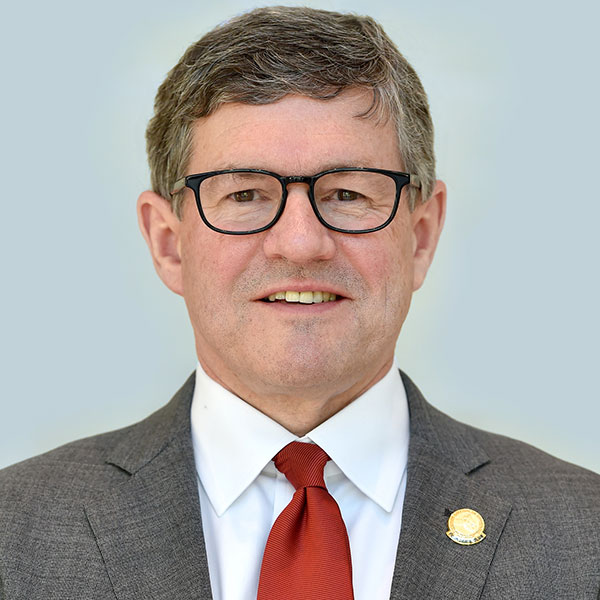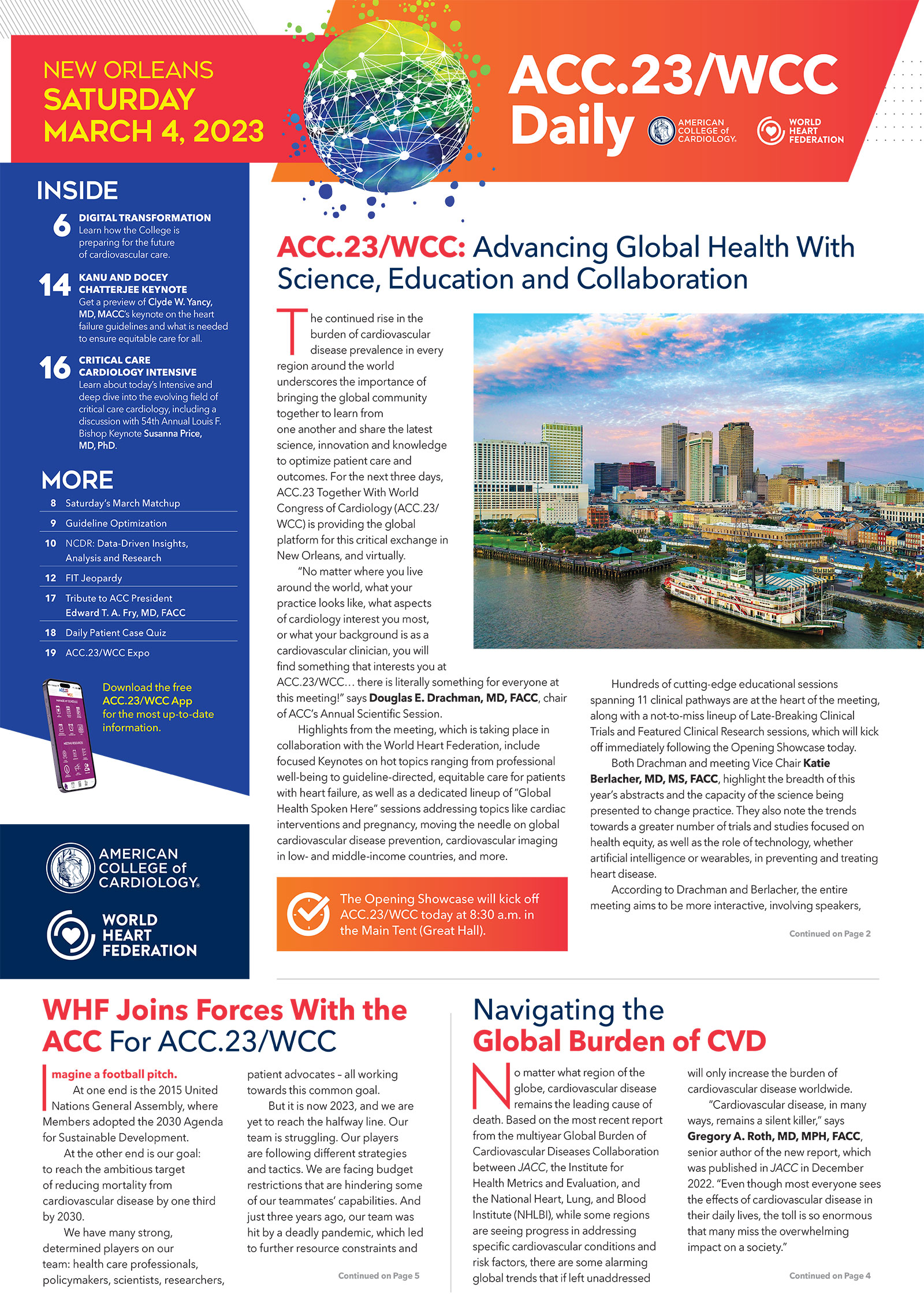ACC.23/WCC Opening Showcase Presidential Address: Edward T. A. Fry, MD, FACC

Welcome to ACC.23 Together with the World Congress of Cardiology. It's a great to be back in New Orleans. This city and the ACC have had a long and notable partnership. In 2007, ACC was the first major meeting to return to New Orleans after Hurricane Katrina. In 2019, the city was our last ACC meeting prior to the pandemic. And now, New Orleans is hosting ACC.23/WCC after the first full year of the world opening back up.
Again, New Orleans and ACC face the challenges and opportunities of a new world together. Just like New Orleans' rebirth, recovery of heart care after the pandemic, may seem daunting, but in many ways, it is like a twist on Charles Dickens. "It was the worst of times; it was the best of times."
Many challenges to cardiovascular medicine actually have their origins well before the pandemic. But over the past year we have seen an accelerated attrition of physicians and care team members as part of the "Great Resignation" or "Quiet Quitting." At the same time, the complexity and prevalence of all forms of heart disease is steadily increasing. As a result of this imbalance, more than half of the US hospitals and many around the world are failing economically, fighting to remain open. This is especially true for safety net and rural hospitals that serve the most vulnerable.
For the first time in eight decades, we have seen a drop in life expectancy in each of the past two years. This is driven in part by COVID and the opioid crisis, but also by increasing mortality from cardiovascular disease, especially among the poor and minorities, reflecting disparities in care and threats to health equity. The health of our communities and the environment around us is also challenged. As the planet gets warmer, more polluted, and weather more extreme, research has shown that these seemingly external factors directly increase our risk of cardiovascular illness.
According to the National Academy of Medicine, these factors, as well as other social determinants of health, such as income, education, race, community safety, employment, family support, and personal behaviors actually account for more than 80% of one's overall health. Addressing these "nonmedical issues" are essential to optimizing cardiovascular health for individuals and the public as a whole. Sadly, we have also seen that self-inflicted disasters such as the wars in countries and regions like Ukraine and Africa, and natural disasters like the recent massive earthquakes in Turkey and Syria, compound the health and well-being of individuals and countries, both directly and indirectly.
From a practical standpoint, the bureaucracy, and burdens of care that "take our eye off the ball," or away from the patient, challenge our ability to deliver on the quadruple aim of optimizing access, outcomes, efficiency and professionalism. This also detracts from clinician wellness and from attracting young people to careers in cardiovascular medicine. Economic instability and declining support combined with the unintended consequences of ineffective regulation have resulted in additional barriers to meeting these goals for patients, clinicians and communities. Increasingly, these challenges and a collective perception of a chaotic world out-pacing our ability to cope have led to a sense of futility – compromising clinician well-being and fueling an epidemic of burnout across the cardiovascular team.
If these challenges were not enough, perhaps the most threatening and concerning is the rise of mistrust of science, research, and education – the very foundation of the House of Medicine and basis of the patient-clinician relationship. The power of technology and modern communication that can do so much good has been twisted by a few to amplify the harmful messages of misinformation and disinformation highlighting divides socially, politically, and in terms of civility.
So, in the spirit of Dickens, if these are the worst of times, how can we be facing the best of times? In many ways this is exactly what ACC.23/WCC is about – to highlight the positives of evolving basic research, clinical investigation, medical education, technology, best practices, nonclinical competencies, and innovation that will be the solutions to overcome these seemingly impossible challenges. Accordingly, ACC and WHF have had to be nimble, resourceful, and creative to meet these immediate challenges, while also moving the fields of cardiovascular science and education forward. Clinician's tools have had to evolve and adapt rapidly to meet present and future needs, specifically through modernizing guidelines, registries, education, publications, advocacy, as well as how and where we deliver care.
During the past year we have seen the continued evolution from traditional guidelines toward the concept of "clinical guidance." Enhancing the production of guidelines and development of derivative clinical tools has helped put practical, evidence-based "clinical guidance" into the hands of clinicians more rapidly, while new technologies and digital innovations bring them directly to the point of care. Similarly, Registry Optimization aims to increase the value and utility of standardized clinical quality data collection to support individual and system-level performance improvement. Reducing the burden of data collection and integrating registries with other ACC quality improvement assets helps take advantage of natural "synergies" across the College to improve care. Registries are also adapting to the evolving needs and opportunities of new sites of care. So, as care changes, registries are evolving.
One positive to come out of COVID has been increased accessibility to cardiovascular education through an array of virtual and in-person options, making access to current medical knowledge easy, affordable, flexible and customizable. Our domestic and international chapters have led the way in promoting timely education to all, making the globe our classroom. In addition, expansion of the JACC family of journals with innovative and interactive ways to present the latest science, clinical guidance, and education has increased readership and impact across the 10 journals, serving many audiences.
A direct connection between the Journals and ACC Member Sections has resulted in high impact publications focused on member-prioritized clinical topics. One such example is maternal health. The epidemic of maternal mortality and recent legal decisions limiting reproductive care has focused attention on the impact of cardiovascular risk and disease in women before, during and long after pregnancy. A landmark series of papers published in JACC last April highlighted the need for cardiovascular clinicians to view maternal health through the lens of cardiovascular health. To best support this need, the Board of Trustees just recently established the new Reproductive Health and Cardio-Obstetrics Clinical Section.
Maternal health has also been a focus of federal and state advocacy efforts by the College to promote access and safeguard women's health. Other advocacy wins this past year have included turning back draconian Medicare cuts to ablation and interventional services and legislation to rationalize prior authorization for cardiovascular testing and treatment. We have also made strides in advancing policies that would increase research on coronary artery disease in patients of South Asian descent and patients with valvular disease, protecting health care workers from violence in the workplace, and supporting mental health services for health care professionals.
Advances in science, research and education are all necessary to optimize cardiovascular care, but true transformation will only come from changing how and where we deliver care. The work force crisis will require that we master nonclinical competencies by using innovation and technology. "Collaborative intelligence" will allow us to work more efficiently and with less friction. Alternative sites of care in the home, virtually, or outside the traditional walls of hospitals or offices will offer patients greater access, fewer delays and greater connection to the entire care team while consuming fewer resources.
However, the most foundational change we must make as an organization and profession to meaningfully transform heart health will be to focus our efforts "upstream" to tackle social determinants, public health policy, health care funding, and primordial prevention. Team-based care is critical to these efforts and will need to evolve to meet the supply-demand challenges of too few caregivers and an aging population. To best understand these issues and to pose practical solutions, an ACC Presidential Task Force has worked on these problems intensively throughout the year and will present its findings and recommendations at this meeting on Sunday morning.
In addition to addressing the shortage of cardiovascular clinicians, the College is also addressing the composition of our work force to ensure that cardiovascular professionals reflect the diversity of the communities we live in and serve. We are doing this through initiatives like the ACC Young Scholars Program for high school and college students, which was first launched at ACC.19, as well as efforts like the new ACC Internal Medicine Residents Program to attract residents of diverse backgrounds to pursue cardiology training. Leadership development programs also foster equitable opportunity for the underrepresented to lead our profession. We are privileged to have many of our Young Scholars, IM participants, Leadership Academy participants and research award winners with us this morning!
As the world has opened back up, ACC's global efforts have picked up speed as well, including working directly with individual ministries of health, conducting regional international symposia, and working with the WHF and United Nations agencies to meet the UN's Sustainable Development Goals of reducing mortality from noncommunicable diseases by a third by 2030. Accordingly, International membership continues to grow in numbers and relevance, while the Assembly of International Governors impact has never been stronger.
No doubt the challenges ahead are many, but as we will see at this meeting and in the years to come, the opportunities are boundless. There is only one thing that can stand in our way: Not engaging, not participating in and leading the process of transformation. Engagement is the essential characteristic of professionalism and agency. It is the antidote to burnout. Engaging takes effort but reaps great rewards. It is sustaining personally and professionally. It is the essential ingredient for success.
So not only engage in ACC.23/WCC but engage with your home institutions and practices, engage with your patients and colleagues, and engage with your future. The clouds of the past three years have parted exposing a bright future for our taking. So, as they say in New Orleans, "Laissez les Bon Temps Rouler!"
Clinical Topics: Acute Coronary Syndromes, Anticoagulation Management, Arrhythmias and Clinical EP, Cardiac Surgery, Congenital Heart Disease and Pediatric Cardiology, Diabetes and Cardiometabolic Disease, Dyslipidemia, Geriatric Cardiology, Heart Failure and Cardiomyopathies, Invasive Cardiovascular Angiography and Intervention, Noninvasive Imaging, Pericardial Disease, Prevention, Pulmonary Hypertension and Venous Thromboembolism, Sports and Exercise Cardiology, Stable Ischemic Heart Disease, Valvular Heart Disease, Vascular Medicine, Anticoagulation Management and ACS, Implantable Devices, SCD/Ventricular Arrhythmias, Atrial Fibrillation/Supraventricular Arrhythmias, Cardiac Surgery and Arrhythmias, Cardiac Surgery and CHD and Pediatrics, Cardiac Surgery and Heart Failure, Cardiac Surgery and SIHD, Cardiac Surgery and VHD, Congenital Heart Disease, CHD and Pediatrics and Arrhythmias, CHD and Pediatrics and Imaging, CHD and Pediatrics and Interventions, CHD and Pediatrics and Prevention, Acute Heart Failure, Pulmonary Hypertension, Interventions and ACS, Interventions and Imaging, Interventions and Structural Heart Disease, Interventions and Vascular Medicine, Angiography, Nuclear Imaging, Hypertension, Sleep Apnea, Sports and Exercise and Congenital Heart Disease and Pediatric Cardiology, Sports and Exercise and ECG and Stress Testing, Sports and Exercise and Imaging, Chronic Angina
Keywords: ACC23, ACC Annual Scientific Session, ACC Scientific Session Newspaper, ACC.23/WCC Meeting Newspaper, Acute Coronary Syndrome, Anticoagulants, Arrhythmias, Cardiac, Cardiac Surgical Procedures, Metabolic Syndrome, Angina, Stable, Heart Defects, Congenital, Dyslipidemias, Geriatrics, Heart Failure, Angiography, Diagnostic Imaging, Pericarditis, Secondary Prevention, Hypertension, Pulmonary, Sleep Apnea Syndromes, Sports, Exercise Test, Heart Valve Diseases, Aneurysm
< Back to Listings


